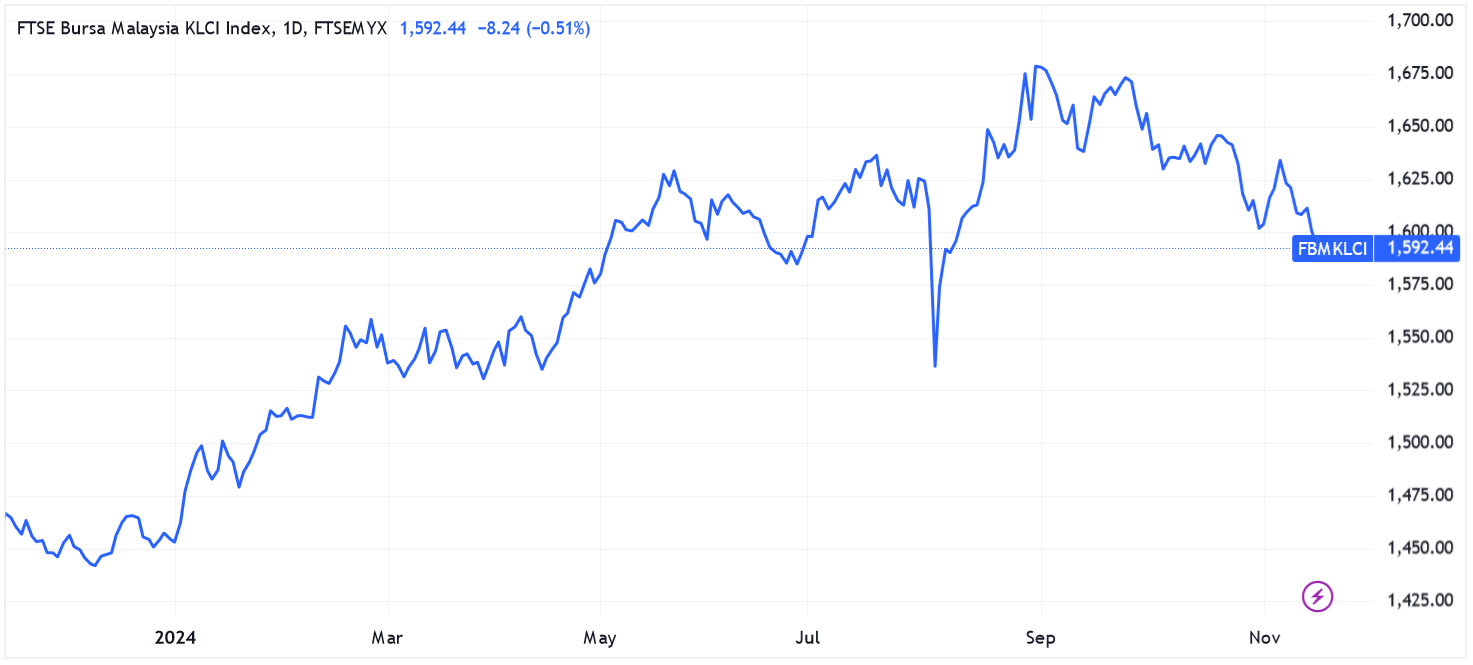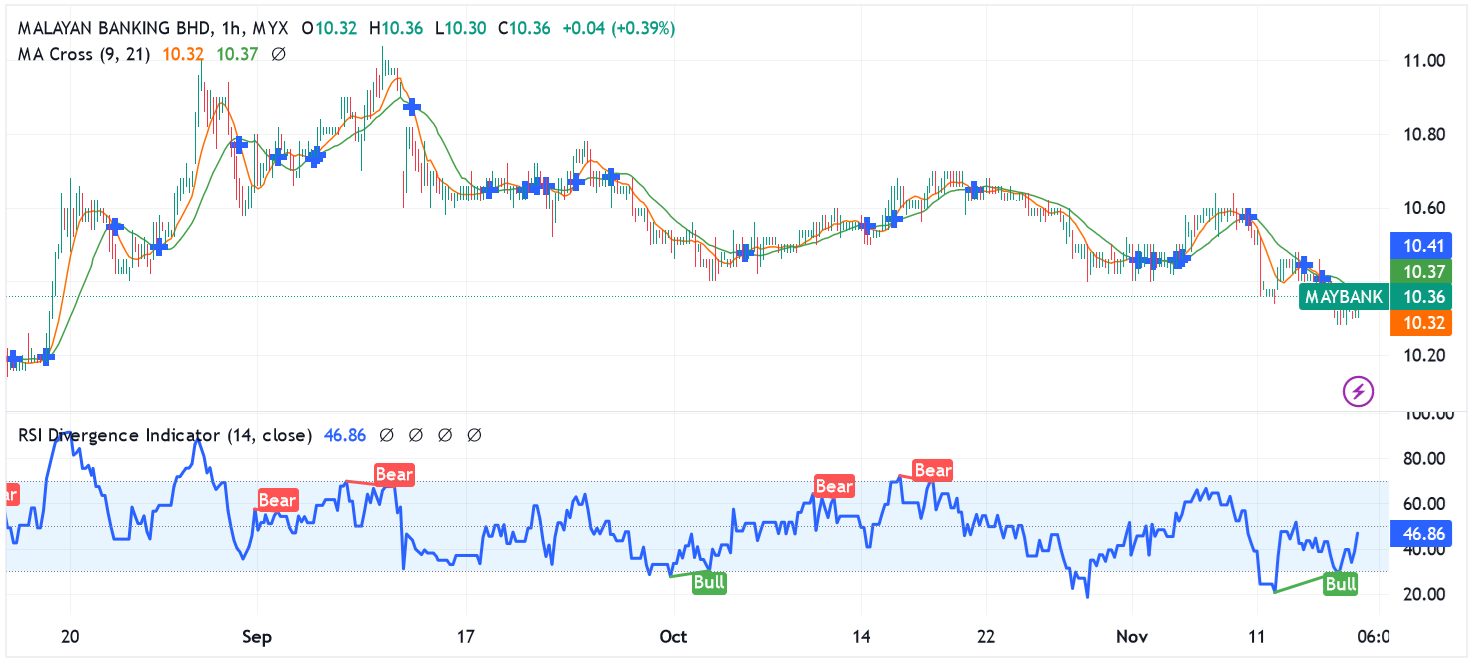CFD Trading In Malaysia



Contracts for difference (CFDs) are popular financial instruments that can be used to trade a wide variety of financial markets. In Malaysia, interest in these complex products is picking up as the local economy booms and the availability of online platforms grows.
In this guide, we’ll reveal the key things beginners need to know to begin CFD trading in Malaysia. We’ll discuss the different asset classes these derivatives allow you to trade, talk about the regulatory and tax regime in Malaysia, and show you what a CFD trade might look like in the real world.
Quick Introduction
- CFDs enable you to trade a broad spectrum of financial securities, including local shares on the Bursa Malaysia, Malaysia’s official stock exchange.
- Traders often use leverage when dealing in CFDs, a high-risk strategy that can amplify both profits and losses, necessitating strict risk management.
- CFD trading is overseen by the Securities Commission Malaysia (SC), the body responsible for regulating the country’s markets, a ‘yellow tier’ body in DayTrading.com’s Regulation & Trust Rating.
- Active traders may need to pay personal income tax on their CFD earnings at a rate of 0% to 30% to the Inland Revenue Board of Malaysia (IRBM).
Best CFD Brokers In Malaysia
Based on our hands-on tests, we’ve pinpointed these 4 CFD providers as the best for traders in Malaysia:
-
1
 IC Markets
IC Markets -
2
 XM
XM -
3
 AvaTrade
AvaTrade -
4
 Pepperstone75-95% of retail investor accounts lose money when trading CFDs
Pepperstone75-95% of retail investor accounts lose money when trading CFDs
How Does CFD Trading Work?
CFDs are a type of derivative product whose value is based on that of an underlying financial asset like a stock, commodity, cryptocurrency or forex pairing.
These instruments allow traders to bet on market movements without the hassle or the additional expense of owning the underlying security. On top of this, leverage – borrowed funds to increase trading exposure – is widely available in the CFD market.
These additional funds give traders the opportunity to control a much larger position. I simply need to deposit a small portion of the total position value to place my trade. This is known as margin.
Leverage gives individuals an opportunity to make much larger profits. However, it can also result in thumping losses if the market moves in the ‘wrong’ direction. For this reason, traders need to establish a strict risk management strategy.
Here’s how it works…
Let’s say I want to bet on the movement of the FTSE Bursa Malaysia KLCI, commonly known as the FBM KLCI. This index tracks the performance of the top 30 companies listed on Bursa Malaysia by market capitalization.

If I believe the blue-chip index will rise, I’ll buy a CFD that’s linked to the index. If each contract trades at 1,600, and my brokerage requires a 20% margin, I’ll need a margin of 3,200 Malaysian ringgit (MYR) to purchase 10 contracts (1,600 per contract x 10 contracts x 20%).
Were the FBM KLCI to rise to 1,650, I’d be looking at a gain of MYR 50 per contract. If I closed my position at this point, I’d make a profit of MYR 500, excluding trading fees (10 contracts x 50 MYR per contract).
Conversely, if the FBM KLCI were to fall to 1,550, closing my position at this point would see me lose MYR 500.
This example illustrates the high-risk, high-return nature of trading with borrowed funds. Given the dangers, I believe individuals should trade with zero or low leverage when starting out.
Beginners should also consider using a demo trading account, whereby they can get up to speed with CFDs without putting any actual money on the line. This can be a good idea regardless of whether an individual decides to use leverage in their trading strategy.
What Can I Trade With CFDs?
Traders can aim to profit from a wide variety of asset classes with CFDs, both in Malaysia and in other international markets:
- Stock CFDs: You can buy and sell some of the Malaysia stock market’s biggest and most popular shares like financial services provider Maybank, utilities company Tenaga Nasional, and private healthcare group IHH Healthcare. Short-term trading in US, European and Asian equities is also highly popular.
- Index CFDs: Alongside domestic indices like the FBM KLCI, individuals can trade popular overseas indices like the FTSE 100 and the S&P 500 with the use of CFDs.
- Forex CFDs: You can buy CFDs that track pairings like the MYR/USD and MYR/EUR, which pit the ringgit against the US dollar and euro respectively. However, day traders tend to prefer contracts involving major pairings (like the EUR/USD and GBP/USD) that enjoy greater liquidity.
- Commodity CFDs: Malaysia is a significant global producer of several commodities, including palm oil, rubber and tin. Traders can deal in CFDs backed by these key materials, along with contracts that deal in other raw materials.
- Cryptocurrency CFDs: The growing digital economy has supercharged interest in CFDs that are linked to virtual currencies. Popular virtual assets Bitcoin and Ethereum can be traded with these derivatives.
The range of financial assets traders can bet on with CFDs may vary greatly depending on the broker you use. So check this out before you open a trading account.
Some CFD providers allow clients to trade using the local currency instead of a major one like the USD. This can be a great way for traders to eliminate forex conversion fees and make the trading process simpler.DayTrading.com has created a list of the top brokerages offering MYR-based accounts today.
Is CFD Trading Legal In Malaysia?
Trading CFDs is legal and supervised by the Securities Commission Malaysia (SC).
Established under the Securities Commission Act 1993, the commission’s mission statement is “to promote and maintain fair, efficient, secure and transparent securities and derivatives markets; and facilitate the orderly development of an innovative and competitive capital market.”
The SC is responsible for regulating and supervising Malaysia’s financial markets, and it carries out enforcement action where it identifies misconduct.
It is classified as a ‘yellow-tier’ regulator under DayTrading.com’s Regulation & Trust Rating, meaning investors can expect a strong level of protection.
Brokerages must receive a licence to do business in Malaysia, and the SC helpfully provides a search facility on its website for traders to locate authorized firms. This helps individuals avoid the clutches of fraudulent companies. Click on ‘Advanced Search’ to use.
Is CFD Trading Taxed In Malaysia?
Yes. Active CFD traders may be liable for personal income tax, which is charged at the following rates:
| Taxable Income (MYR) | Tax Rate |
|---|---|
| 0 to 5,000 | 0% |
| 5,001 to 20,000 | 1% |
| 20,001 to 35,000 | 3% |
| 35,001 to 50,000 | 6% |
| 50,001 to 70,000 | 11% |
| 70,001 to 100,000 | 19% |
| 100,001 to 400,000 | 25% |
| 400,001 to 600,000 | 26% |
| 600,001 to 2,000,000 | 28% |
| 2,000,001+ | 30% |
Malaysia’s tax system is administered by the Inland Revenue Board of Malaysia (IRBM).The tax year runs from 1 January to 31 December, and tax returns must be completed and sent in by 30 April the following year.
A CFD Trade In Action
Armed with this information, I’m now ready to start trading. Let’s now look at how dealing Maybank shares using a CFD might look.
The Background
My plan is to buy the CFD before the Central Bank of Malaysia makes its next interest rate statement, and to sell it shortly thereafter for a juicy profit.
After studying recent economic data, I conclude that interest rates are likely to remain locked at 3%. I use a range of key information like inflation numbers, GDP statistics and employment surveys to help me decide.
By comparison, the broader market expects the central bank to chop interest rates by 0.25%, to 2.75%. If my contrarian take is correct, banking stocks like Maybank could rise in value, as higher interest rates provide a significant boost to firms’ profit margins.
Before I place my trade, I check the charts to identify key trend lines, chart patterns and indicators for Maybank shares. Technical analysis like this helps me to pinpoint entry and exit positions for my trade.

The Trade
With my research over, I prepare to place my trade in Maybank CFDs. I open my trading platform at 14:50 Malaysia Time (MYT), which is ten minutes before the interest rate announcement.
At this time, the CFD I want is trading at MYR 10.36. I choose to buy 1,000 contracts using margin of 20%, which means me depositing MYR 2,072 in my trading account (10.36 per contract x 1,000 contracts x 20%).
Creating my position is a two-stage process involving take profit and stop loss orders. These tools help me to manage risk, by automatically closing my trade if the CFD price rises or falls to a level I select, whichever comes first.
In this case, I decide to:
- Place a take profit instruction at 10.68.
- Put in a stop loss order at 10.23.
Shortly after keying in my trades, the Central Bank of Malaysia announces that it’s kept interest rates on hold at 3%. This is in line with my contrarian bet, and within 30 minutes my Maybank CFD has breached my take profit level of 10.68, closing my position.
As a result, I book a profit of MYR 320 for the trade (MYR 0.32 x 1,000 contracts).
Bottom Line
CFD trading in Malaysia provides individuals with a wealth of opportunity. Traders can profit across a multitude of different financial markets. And they have the chance to substantially boost their profits with the use of leverage.
Having said that, dealing derivative products like this with borrowed funds is also a high-risk endeavor. Therefore, trading with elevated levels of leverage should be attempted only by experienced traders who have a strong risk tolerance.
To start trading CFDs in Malaysia, explore DayTrading.com’s choice of the top CFD trading platforms.
Recommended Reading
Article Sources
- Bursa Malaysia
- Securities Commission Malaysia (SC)
- Public Register of Licence Holders and Registered Persons - SC
- Inland Revenue Board of Malaysia (IRBM)
- Local tax information for Malaysia - HSBC
The writing and editorial team at DayTrading.com use credible sources to support their work. These include government agencies, white papers, research institutes, and engagement with industry professionals. Content is written free from bias and is fact-checked where appropriate. Learn more about why you can trust DayTrading.com